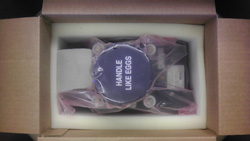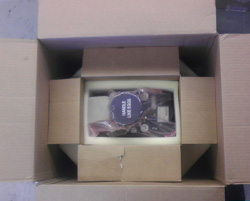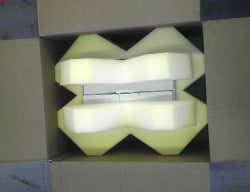Contributed by Nic Evans, Avionics Team Leader
It wasn’t long ago that I wrote an article about how to properly handle your aircraft’s gyroscope and prevent it from being scrambled. To some, this advice may seem obvious and unnecessary, but it continues to amaze me how little thought and effort is given when a gyroscope is packaged and shipped to Duncan Aviation for repair and overhaul. The gyros that are sent in for repair or overhaul with improper packaging have shown a higher degree of damage as a result.
The following are common squawks that can and do occur when a gyroscope is not prepared properly for shipping.
- Rocky Bearings – The bearings within a gyro work together to keep the unit balanced. A rocky bearing occurs when a unit is jostled and causes these bearings to misshapen and stick. This can cause your gyro to be slow to slave or slow to erect.
- Out of balance – A gyro becomes out of balance when the weights within the unit shift or slide.
- Catastrophic failure – There are stops inside a gyro that are in place to prevent a catastrophic failure of a unit. However, a seemingly innocent drop during shipping can break those stops and render the unit inoperable. Just because the box isn’t damaged doesn’t mean the unit inside isn’t.
The best way to ship a gyro is in the same box and packing material it was received in from the manufacturer. However, if that box is long gone, your efforts to prepare your gyro for shipment should be equal to or better than the manufacturer’s packaging. If you take shortcuts when shipping a gyro, you run the risk of voiding all applicable warranties.



Two Box Shipping Method
When the original packing boxes and materials are long gone, the best way to pack a gyroscope for shipping is to use a two-box method. This will ensure that unit is packed securely and more protected against inappropriate handling during transportation.
Step One: Box #1
Place the gyro in a box that is just large enough to hold the unit and enough Styrofoam or other soft packing material to line all sides, including top and bottom. Be sure to include enough packing material so the gyroscope will not shift in the box during shipping. It is better to use too much than not enough.
Step Two: Box #2
After the box containing the unit has been closed and sealed, pack it into a larger box with additional packing material. Do not skimp on the size of the box #2 or the amount of packing materials. The second box must be large enough to fit Box #1 and still allow for at least two inches of packing material between any point of the box and the inside walls of the carton. Make sure that Box #1 will not shift or the packing material to become compressed during shipment.
I cannot stress enough how fragile and delicate of an instrument a gyroscope is. You invest a lot of money keeping gyros airworthy. Duncan Aviation does not want to see your money and effort wasted because of improper shipping, handling and procedures.
Gyro Overhaul
As an Authorized Honeywell Service Center, Duncan Aviation is able to overhaul most Honeywell gyroscopes. If you ship your gyro directly to Duncan aviation for overhaul, you will receive it back within five days using Duncan Aviation's AOG service.
Duncan Aviation has four Avionics Tech Reps at your service to answer your questions or assist in troubleshooting your avionics units, including the gyro.
Nic Evans is an avionics team leader located at Duncan Aviation's Lincoln, Nebraska, facility. He leads a team that specializes in the gyroscope. His aviation career began in 1999.

